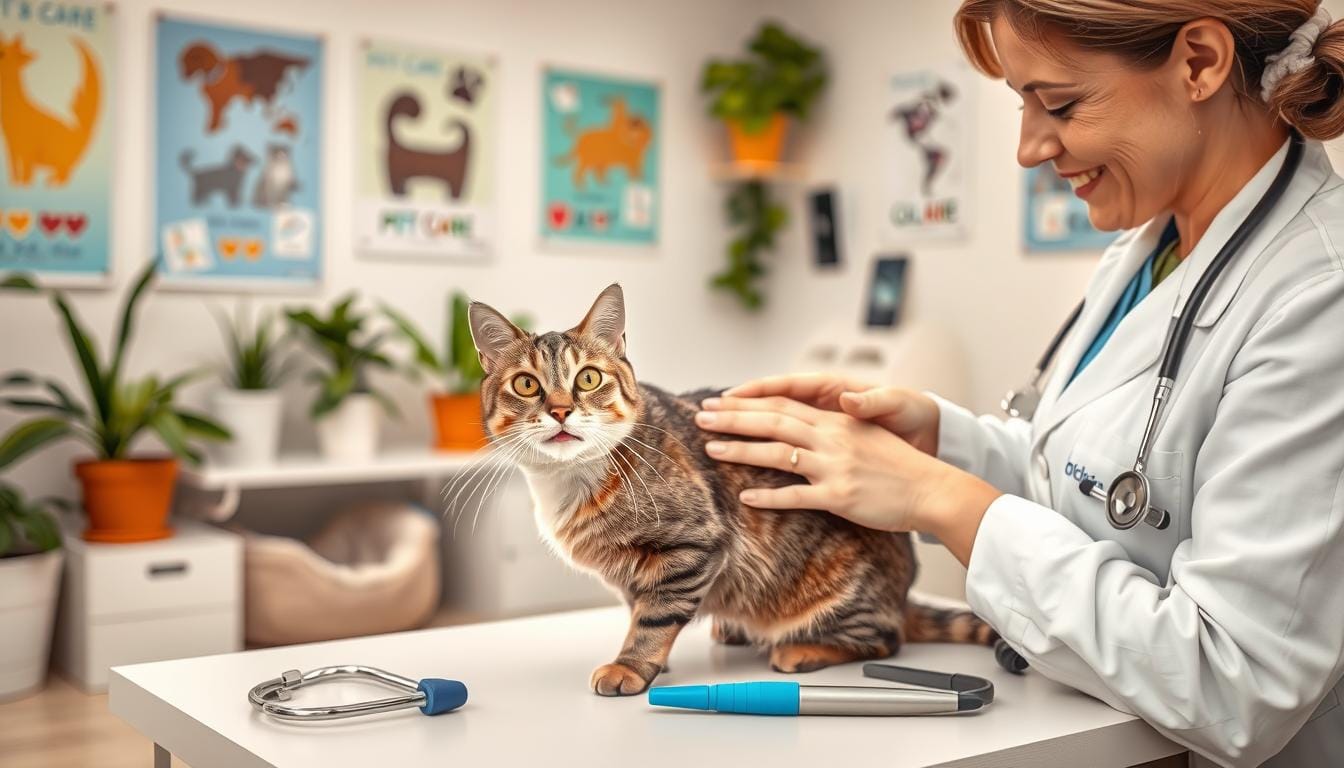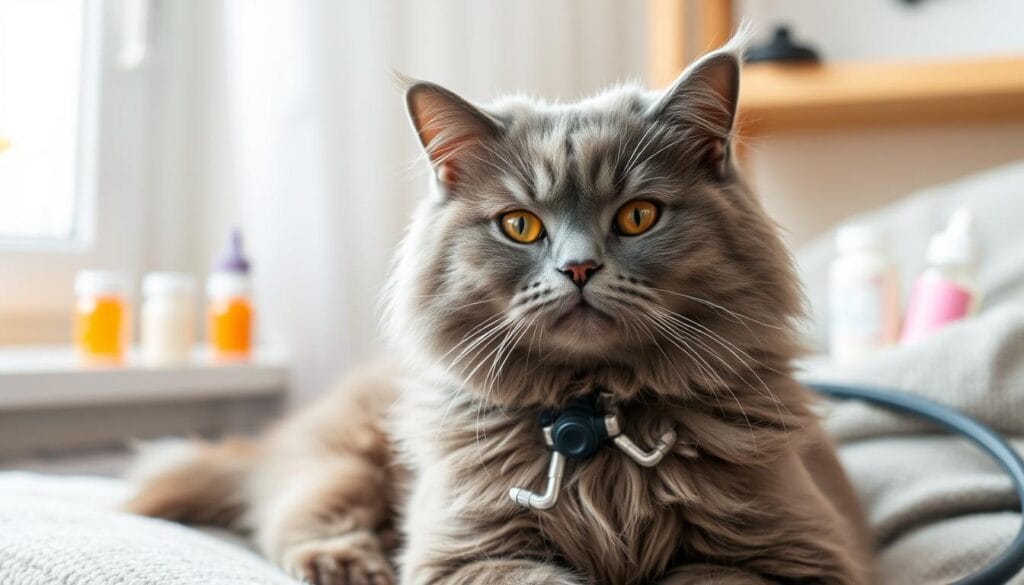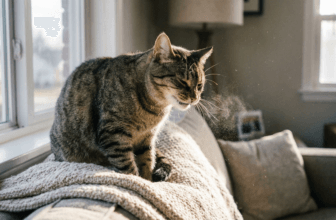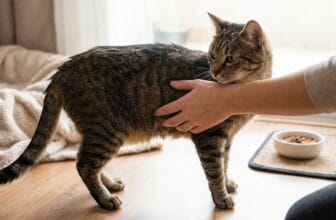
Regular vet check-ups are key for your cat’s health and happiness. Cats need routine medical care to stay healthy. The Importance of Regular Vet Check-Ups for Cats, this includes preventing illnesses, catching health issues early, and living a long, happy life.
Annual or 6-month check-ups, known as wellness visits, can prevent your pet’s suffering. They save you money and teach you more about your pet. It’s best to take your pet to the vet before they get sick or hurt.
Cats are great at hiding when they’re not feeling well. By the time you notice, their health might be worse. Regular vet visits help catch early signs of problems like dental disease, kidney issues, and diabetes. This makes treatment more effective and cheaper.
Table of Contents
Introduction
Regular vet visits are key for cat owners. They keep your cat healthy, happy, and by your side for years. Cats need routine medical care to stay well. This article will talk about why regular vet visits are important for your cat’s health and long life.
The Importance of Veterinary Care for Cats
About 60% of cat owners visit the vet once a year, says the American Veterinary Medical Association. But, regular vet visits greatly improve your cat’s health and happiness.
- Early detection of health issues: Catching problems early can stop them from getting worse and improve your cat’s health.
- Addressing common health problems: Cats often face dental issues, arthritis, obesity, allergies, and skin problems. Proper preventive medicine for felines can help manage these.
- Comprehensive diagnostic tests: Blood work, urine tests, imaging, and physical exams are key in finding health problems early.
Regular vet check-ups make sure your cat gets the care they need to do well. This article will look into how different parts of veterinary care help your cat stay healthy and happy.
Early Detection of Health Problems
Cats are experts at hiding when they’re not feeling well. By the time you notice they’re sick, the problem might be serious. Regular vet visits are key to catching health issues early in cats. This way, experts can spot signs before things get worse.
Cats hide their pain well, a skill they learned in the wild. So, by the time you realize something’s off, they’re already in pain. Regular vet visits help spot common cat health problems early. This includes dental disease, kidney issues, and diabetes, making treatment easier and cheaper.
- Cats are adept at hiding signs of illness, making early detection challenging for pet owners.
- Regular check-ups allow veterinarians to identify potential health problems before they progress.
- Early detection of conditions like dental disease, kidney problems, and diabetes can lead to more effective and less costly treatment.
Being proactive with your cat’s health means regular vet visits. Working with your vet helps catch health issues early. This way, you can help your cat live a better life.
Preventive Care
Regular vet visits are key to keeping your cat healthy and happy. During these visits, your vet will do many things to keep your cat in top shape.
Vaccinations
Vaccines are a big part of keeping cats safe. Your vet will give your cat shots to protect against diseases like rabies, feline leukemia, and distemper. These shots help your cat fight off serious illnesses.
Parasite Control
Keeping your cat free from fleas, ticks, and worms is also crucial. Your vet will suggest the best products to stop these pests. This helps avoid health problems that can come from infestations.
Dental Care
Many people forget about dental care for cats, but it’s very important. At vet check-ups, your vet will check your cat’s teeth and clean them if needed. Good dental care stops gum disease and other dental problems.
By taking your cat for regular vet visits and following your vet’s advice, you can make sure your cat lives a long, healthy life.
| Preventive Care Measure | Benefits |
|---|---|
| Vaccinations | Protect against common and serious diseases |
| Parasite Control | Prevent infestations and associated health issues |
| Dental Care | Maintain good oral health and prevent periodontal disease |
Nutritional Advice
Your cat’s diet changes with age, lifestyle, and health. Regular vet check-ups are key to talk about their cat nutrition. They help make sure your cat gets the right food. Your vet can give diet recommendations and suggest diets or supplements for issues like weight, allergies, or health problems.
Talking to a vet about your cat’s diet is important. They know how to give advice that keeps your pet healthy and happy. They look at your cat’s specific needs and recommend the best diet for their health.
| Life Stage | Recommended Vet Visits |
|---|---|
| Kittens | Monthly wellness checks until maturity |
| Adult Cats | Yearly exams |
| Senior Cats | Biannual checkups |
Talking about your cat’s cat nutrition with your vet ensures they get the best diet. Regular vet visits are key to caring for your pet well.

Behavioral Insights
As a devoted cat owner, you may have noticed changes in your feline’s behavior over time. Some changes can be due to new environments or changes in routine. But, some changes might hint at health issues. Your vet can offer insights into the behavior-health connection in felines.
Cats are good at hiding when they’re not feeling well. That’s why regular vet check-ups are key to spot cat behavior changes that could mean an underlying health issue. Your vet can help you understand your cat’s behavior and what to do next.
At your cat’s check-up, your vet will ask about any changes in behavior, like more aggression, anxiety, or odd grooming. These changes could mean health problems, like dental issues, joint pain, thyroid problems, or neurological issues. By tackling these underlying health issues, your vet can help fix the cat behavior changes.
Working closely with your vet and paying attention to your cat’s behavior can keep your pet healthy. Regular check-ups let your vet give advice on how to make your cat’s life better. This includes tips on their environment, diet, and other ways to keep them physically and mentally healthy. Taking this step can make your life with your cat happier and healthier.
Monitoring Chronic Conditions
As your cat gets older, watch for chronic health issues they might get. Chronic health conditions in cats, like arthritis and hyperthyroidism, can really affect their life if not managed right. It’s key to take them to the vet often to keep an eye on these problems and make sure they stay comfy and healthy.
Cats are good at hiding when they’re not feeling well. That’s why it’s important to trust your vet. At vet visits, your vet can check for early signs of chronic conditions. This way, you can start treatment early and help your cat stay happy and active.
Addressing Common Chronic Conditions
- Arthritis is common in older cats, causing pain and stiffness in their joints. Your vet can suggest medicines, supplements, and changes to their living space to help with feline arthritis.
- Hyperthyroidism is a common issue in cats, making their thyroid gland work too fast. Regular vet visits and special treatments can help manage this condition.
- Cats might also get chronic conditions like kidney disease, diabetes, or cognitive decline. Your vet will keep an eye on these and change your cat’s care plan as needed.
Working with your vet and being proactive about chronic health issues can make your cat’s golden years better. Regular vet visits are crucial for your cat’s comfort and well-being as they age.

Life Stage-Specific Care
As your cat gets older, their health needs change. It’s important to know what they need at each stage of life. Whether your cat is playful, active, or a senior, your vet can give them the right care.
Veterinary Care for Kittens
Kittens need to see the vet often, about every 1-2 months. These visits include shots, checking on their growth, and solving any health problems. Kittens can be spayed or neutered from 4 months old. This step helps prevent unwanted litters and controls cat life stages.
Veterinary Care for Adult Cats
Adult cats, from 7 months to 2 years, should go to the vet every 6 months. These visits help catch health issues early, like obesity, dental problems, or behavior changes. Keeping up with veterinary care for adults keeps your cat happy and healthy.
Veterinary Care for Senior Cats
Senior cats, starting at 7-10 years old, need more complex care. Older cats, 11 years and up, should see the vet twice a year. Vets check for conditions like diabetes, kidney disease, and brain changes, and give veterinary care for seniors to help manage them.
| Cat Life Stage | Recommended Veterinary Check-ups |
|---|---|
| Kittens (under 6 months) | Every 1-2 months |
| Junior (7 months to 2 years) | Every 6 months |
| Adult (3 to 6 years) | Annually |
| Mature (7 to 10 years) | Annually |
| Senior (11 to 14 years) | Twice a year |
| Super Senior (15 years and older) | Twice a year |
Your cat’s health needs can change, and your vet can guide you. They can help your cat get the veterinary care for kittens, adults, and seniors they need at every life stage.
Building a Comprehensive Health History
Regular vet visits are key to keeping a detailed health record for your cat. This record is crucial. It helps your vet spot patterns, make smart treatment choices, and give the best care throughout your cat’s life.
Your cat’s health history acts like a roadmap for your vet. It helps catch early signs of health issues, keep an eye on ongoing conditions, and make sure care is consistent. Keeping a full record of vet visits, treatments, and test results lets your vet tailor care to your cat’s specific needs.
The Importance of Comprehensive Medical Documentation
A detailed health history helps your vet:
- Spot health problems early, when they’re easier and cheaper to fix.
- Keep track of chronic conditions like arthritis or hyperthyroidism, and adjust treatments as needed.
- Ensure care flows smoothly, even if your cat sees different vets over time.
- Decide on preventive care like shots and parasite control based on your cat’s specific needs.
Keeping detailed cat health records lets your vet give your cat the best care. This veterinary history is a powerful tool for your cat’s long-term health and happiness.
| Cat Life Stage | Recommended Vet Visits |
|---|---|
| Kitten (up to 1 year) | Every 3-4 weeks until 16 weeks old |
| Adult (1-7 years) | At least 1 per year |
| Senior (7+ years) | At least 2 per year |
Keeping a detailed medical documentation for your cat is vital for their long-term health. By working with your vet to build this record, you help them give your cat the best care possible.
Peace of Mind for Pet Owners
Knowing your feline friend is healthy brings a lot of peace of mind to pet owners. Regular vet visits help keep your cat happy and healthy. Your vet can give you advice on general care, grooming, and other concerns. This ensures your pet is getting the best care possible.
Staying current with your cat’s routine check-ups and preventive care brings big emotional benefits. These visits keep your cat’s feline health and wellbeing in check. They also give you pet owner peace of mind by catching and fixing problems early.
Your vet is key in checking your cat’s health and offering advice on nutrition, exercise, and medicine. With their help, you can be sure your cat is getting top-notch care. This lets you enjoy time with your cat without worry.
Regular vet visits are key for caring for your pet, ensuring they stay healthy and happy. By focusing on preventive care, you protect your cat’s health and nurture the special bond with your pet.
What to Expect During a Veterinary Check-Up
Keeping your cat healthy is very important. Regular vet visits are key to their well-being. At a typical check-up, your cat will get a full exam. This covers their physical and behavioral health.
Physical Examination
The vet will do a detailed physical exam to check your cat’s health. They’ll look at their eyes, ears, mouth, skin, and coat for any issues. They’ll also listen to their heart and lungs, feel their belly, and check their joints for pain or arthritis.
Diagnostic Testing
If your cat is older or has health issues, the vet might suggest diagnostic testing. This could be blood work, urine tests, or X-rays. These tests give the vet a full picture of your cat’s health inside out, spotting problems that aren’t seen during the exam.
Preventive Care
The vet will also make sure your cat’s shots are current and give them parasite prevention treatments. This keeps your cat healthy and safe from common diseases and parasites.
Regular vet visits are crucial for your cat’s health. They let the vet check your cat’s physical exam components and spot health issues early. By keeping up with diagnostic testing for felines, you help your cat live a long, healthy, and happy life.
| Examination Component | Purpose |
|---|---|
| Eyes, Ears, Mouth, Skin, Coat | Assess overall physical condition |
| Heart and Lungs | Evaluate cardiovascular and respiratory health |
| Abdomen | Detect any abnormalities in internal organs |
| Joints | Check for signs of arthritis or discomfort |
| Diagnostic Tests | Identify underlying health issues |
| Vaccinations and Parasite Prevention | Maintain your cat’s overall health and wellness |
Conclusion
Regular vet check-ups are key for cat owners. They help keep your cat healthy, happy, and long-lived. These visits let your vet catch and prevent illnesses early.
Don’t wait for your cat to show signs of sickness to go to the vet. Cats hide when they’re not feeling well. So, regular check-ups are vital for their health. They cover everything from shots and meds to checking their weight and dental health.
Whether your cat stays inside or goes outside, seeing the vet every year is important. A good relationship with your vet means better care for your cat. Make sure to book your cat’s next check-up today for their health and happiness.
FAQ
Why are regular veterinary check-ups important for my cat?
Regular vet visits are key for your cat’s health and happiness. They help prevent illnesses and catch problems early. This ensures your cat lives a long, happy life.
How can regular check-ups help detect health problems in my cat?
Cats often hide when they’re not feeling well. By the time symptoms show, problems might be serious. Regular vet visits help spot early signs of issues like dental disease and kidney problems. This makes treatment easier and cheaper.
What types of preventive care are provided during a veterinary check-up?
Vets perform vaccinations, parasite control, and dental care during check-ups. These steps protect your cat from diseases, infestations, and dental problems. They keep your cat healthy overall.
Why is it important to discuss my cat’s diet with the veterinarian?
Cats’ dietary needs change with age, lifestyle, and health. Regular vet visits let you talk about your cat’s diet. Your vet can suggest diets or supplements to meet health needs.
How can a veterinarian help with behavioral changes in my cat?
If your cat acts differently, your vet can check for medical reasons or suggest environmental changes. They can help you understand how behavior relates to health and wellbeing.
Why are regular check-ups essential for cats with chronic conditions?
Cats with ongoing health issues need regular vet visits. These visits help monitor and manage conditions like arthritis. Your vet can adjust treatments to keep your cat comfortable and healthy.
How do a cat’s health needs change as they age?
Kittens need shots and spaying/neutering. Adults need regular check-ups. Senior cats may need more visits for age-related problems. Your vet can tailor care for your cat’s life stage.
Why is it important to maintain a comprehensive health history for my cat?
Keeping a detailed health history helps spot patterns and make informed treatment choices. It aids in early detection of signs, chronic condition management, and ensures consistent care throughout your cat’s life.
What can I expect during a typical veterinary check-up for my cat?
A check-up includes a physical exam of your cat’s eyes, ears, mouth, skin, coat, and body. The vet will also listen to the heart and lungs, check the abdomen, and examine the joints. Blood tests, urine tests, or other diagnostics might be recommended based on your cat’s age and health.
Source Links
- https://www.forcatsonlyvet.com/post/the-importance-of-regular-veterinary-check-ups-for-cats – The Importance of Regular Veterinary Check-Ups for Cats
- https://www.zoetispetcare.com/blog/article/regular-veterinary-check-ups – 5 Reasons Your Pet Should Have Regular Veterinary Check-Ups
- https://www.purina.co.uk/articles/cats/health/daily-care/regular-vet-check-ups – The Importance of Regular Vet Check-ups for Cats | Purina
- https://medium.com/@mrvethospital1/the-importance-of-regular-vet-check-ups-ensuring-long-term-pet-health-767fbe78a544 – The Importance of Regular Vet Check-ups: Ensuring Long-Term Pet Health
- https://www.graygroupintl.com/blog/pet-vet-check-ups – Pet Vet Check-Ups: Ensuring the Health and Well-Being of Your Pet
- https://www.crmvc.com/the-importance-of-regular-vet-check-ups-for-pets/ – The Importance of Regular Vet Check-Ups for Pets | Crossroads Mobile Veterinary Clinic
- https://doobert.com/the-importance-of-regular-vet-check-ups-for-your-feline-friend/ – The Importance of Regular Vet Check-ups for Your Feline Friend – Doobert The Importance of Regular Vet Check-ups for Your Feline Friend
- https://pet-power.eu/the-importance-of-regular-vet-checks/ – Pet Power | The importance of regular vet checks
- https://www.slatonvet.com/the-importance-of-regular-check-ups-advice-from-a-cat-care-hospital/ – The Importance of Regular Check-Ups: Advice From a Cat Care Hospital – Slaton Veterinary Hospital
- https://www.pethealthnetwork.com/cat-health/cat-checkups-preventive-care/why-your-cat-needs-regular-checkups – Why Your Cat Needs Regular Checkups
- https://www.ministryofcat.com/blog/the-importance-of-regular-vet-visits-for-your-cat – The Importance of Regular Vet Visits for Your Cat | Ministry of Cat | Cat Cafe in Phnom Penh
- https://www.catster.com/cat-health-care/importance-of-regular-cat-checkups/ – The Importance of Regular Cat Checkups: 4 Vet Reviewed Benefits – Catster
- https://invma.org/the-purr-fect-practice-why-regular-vet-visits-are-essential-for-your-feline-friend/ – The Purr-fect Practice: Why Regular Vet Visits are Essential for Your Feline Friend – INVMA
- https://www.advancedcarevet.com/site/blog/2023/01/15/regular-vet-checkups-important – Advanced Care Veterinary Hospital
- https://invma.org/the-importance-of-taking-your-cat-to-the-veterinarian/ – The Importance of Taking Your Cat to the Veterinarian – INVMA
- https://www.catsluvus.com/cat-grooming/the-importance-of-regular-vet-check-ups-for-cats/ – The Importance Of Regular Vet Check-Ups For Cats – Cat Boarding Hotel Laguna, Mission Viejo, Anaheim, Santa Ana, CA | Cats Luv Us
- https://kjubiimods.com/the-importance-of-regular-vet-check-ups-for-cats/ – The Importance of Regular Vet Check-ups for Cats – CatFacts
- https://catsathomepetsitting.com/2023/12/15/importance-vet-check-ups-cats/ – Importance Regular Vet Check-Ups – Cats at Home Pet Sitting
- https://hamptonparkvet.com/regular-vet-check-ups-play-a-pivotal-role-in-cats-health/ – Regular Vet Check-ups Play a Pivotal Role in Cats’ Health
- https://www.catcare4life.org/advice/frequency-of-veterinary-check-ups/ – Frequency of veterinary check ups – Cat Care for Life
- https://www.islandvetgroup.com/life-stages-and-cat-health/ – Life Stages and Cat Health
- https://catfriendly.com/keep-your-cat-healthy/routine-veterinary-care/ – Routine Veterinary Care | The Cat Community
- https://www.cochiseanimalhospital.com/blog/why-regular-vet-visits-are-essential-for-your-pets-health.html – Why Regular Vet Visits Are Essential for Your Pet’s Health
- https://www.contentcritter.com/reasons-why-you-should-schedule-regular-vet-check-ups-for-your-pet/ – Reasons Why You Should Schedule Regular Vet Check-ups for Your Pet – Content Critter
- https://www.hudsonanimalhospitalnyc.com/services/cats/feline-wellness-checkups – The Importance Of Cat Wellness Exams
- https://abcvetoflewisville.com/blog/early-detection-lifelong-protection-why-regular-vet-check-ups-are-essential-for-your-pet-s-health – Early Detection, Lifelong Protection: Why Regular Vet Check-Ups Are Essential for Your Pet’s Health
- https://sandiegovets.com/blog/the-importance-of-regular-vet-check-ups-for-your-pets-well-being/ – The Importance of Regular Vet Check-Ups for Your Pet’s Well-Being | San Diego Vets
- https://vcahospitals.com/know-your-pet/wellness-examination-in-cats – Wellness Examination in Cats | VCA Animal Hospitals
- https://www.haywoodvet.com/services/cats/feline-wellness-checkups – Cat Wellness Exams – What To Expect From Your Cat’s Annual Wellness Exam
- https://bluepet.com/blog/annual-checkups-for-your-cat/ – The Importance of Annual Checkups for Your Cat – Blue Cross Pet Hospital
- https://www.getoutpass.com/blog/the-importance-of-regular-vet-check-ups-for-cats/ – Get out pass | The Importance of Regular Vet Check-Ups for Cats








[…] flat faces can lead to breathing, eye, and dental problems. It’s crucial to take them to the vet regularly and keep up with preventative care to ensure they stay […]
[…] it can still have problems. Long-term effects include liver damage and other organ issues. Regular vet visits are important to check on your cat’s health after chocolate […]
[…] kittens from parvo is crucial. Vaccination and regular vet visits are key. Keeping your cat healthy is essential for their […]
[…] https://purrisphere.com/cats/cat-health/importance-of-regular-vet-check-ups-for-cats/Watch your cat closely for any bad signs. If you see these problems, call your vet right away. They might need to make your cat vomit or give them fluids to help them feel better. […]
[…] watch out for chronic cinnamon exposure. If you think your cat has eaten cinnamon, see a vet. Regular vet visits can help catch and treat problems early, keeping your cat […]
[…] care is essential for your cat’s health. This includes regular vet exams, vaccinations, and checking vital signs. Watching for behavioral changes and monitoring their […]
[…] Regular vet visits and watching your cat closely are important. Look at their behavior, grooming, and litter box use. This helps catch problems early. Remember, taking care of your cat is a team effort. By staying alert and proactive, you can make sure your cat gets the care they need. […]
[…] taking your cat to the vet regularly is important. This can catch health problems early. Problems like nerve issues or anal gland issues can make a […]
[…] key to tackle your cat’s stress before stopping the licking. Check-ups with the vet can rule out health problems. Techniques like making their environment richer and rewarding good […]
[…] Regular vet check-ups to monitor thyroid function. […]
[…] appetite, many health issues in senior cats go unnoticed until they become severe. This is where regular vet visits for senior cats play a critical […]
[…] and working closely with your vet, you can ensure your cat enjoys a healthy, fulfilling life. Regular checkups and preventive care are the foundation of their […]
[…] early signs of health problems, we’ve got you covered. Discover why proper nutrition and regular vet checks matter, especially for conditions like progressive retinal atrophy. You’ll walk away ready to […]
[…] immediately. Most pets show improvement within 3-5 days when underlying problems are addressed. Regular vet check-ins ensure treatment plans evolve with your companion’s […]
[…] too. A cramped or poorly maintained bathroom area may stress animals, amplifying odd behaviors. Regular vet checkups help rule out deficiencies while ensuring balanced diets meet all […]
[…] suggest regular check-ups to track your cat’s recovery. Blood tests can spot health issues […]
[…] your cat healthy means getting regular vet advice and check-ups. It’s important to check for essential oil risks to keep your cat safe from […]
[…] individual needs when choosing a balanced diet. Weight, activity level, and health are important. Regular vet check-ups help fine-tune your cat’s diet for optimal […]